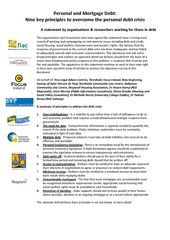National organisations present key principles to overcome personal debt and mortgage arrears crisis
19 October 2011

A grouping of national organisations which advocate for people struggling with debt problems, including families at risk of losing their homes, warned today that the Government's response on this issue to date is inadequate. Launching a joint statement on key principles to overcome the personal debt and mortgage arrears crisis, the bodies said that measures proposed in the recent Keane Report could not tackle the growing problem of personal debt effectively as they did not encompass the full scale of personal debt.
The organisations joined with policy researchers to highlight growing concern at the mounting issue of debt and mortgage arrears crisis in society, stressing that there are certain basic principles that must underpin policy responses to the current debt crisis in order to protect households most at risk.
While there is a general consensus around the need for a comprehensive response to the debt crisis, the group members emphasise that this response must be just, fair and multi-dimensional. It must address not just mortgage arrears but the totality of personal debt.
"There must be an independent debt resolution agency which will oversee first the introduction and then the ongoing implementation of a new legal regime," said FLAC Senior Policy Researcher Paul Joyce, on behalf of the group.
"Ultimately, the aim of any measures to tackle the debt crisis must be to keep people in their homes where appropriate and to ensure access to social housing where needed."
Group members are meeting the Dáil Finance Committee later today to articulate their 'Nine Principles to Overcome Personal Debt', the fruit of months of joint discussions which was launched at a press conference in Dublin. The group says these principles must be used as a basis to address the crisis and implement reforms. As the joint statement concludes:
The social and economic costs of the minimal policy intervention we are currently experiencing will, in all likelihood over time, outweigh the costs of responding comprehensively now. We therefore urgently call for a national strategy to be put in place to resolve over-indebtedness and to foster a responsible credit market that can prevent a similar crisis from occurring for future generations.
/ENDS
Editors' notes:
- The organisations and individuals who have agreed the joint statement/9 key principles on debt are as follows: FLAC (Free Legal Advice Centres), Threshold, Focus Ireland, New Beginning, Society of Saint Vincent de Paul, Northside Community Law Centre, Ballymun Community Law Centre, Respond! Housing Association, Dr Stuart Stamp (NUI Maynooth), Ciara Murray (Public Information Consultant), Simon Brooke (Housing and Social Policy Consultant), Dr Michelle Norris (University College Dublin), Dr Padraic Kenna (NUI Galway).
- The above-mentioned group are not an ongoing coalition. Members have been meeting for a number of months to discuss the personal debt crisis. A number of common concerns emerged from these discussions which led to the compilation of the nine principles.
- Members of the group will be campaigning separately on the issue of resolving the personal debt and mortgage arrears crisis, but using the nine principles as a basis for this work.
- Group members will be available for comment following the press conference to be held at 11am on Weds 19 October, Buswells Hotel, Dublin 2. All press enquiries prior to that time should be directed to Paul Joyce/Yvonne Woods on behalf of the group.
- The Keane Report is the latest in a series of reports on the mortgage arrears crisis and was compiled by the Interdepartmental Mortgage Arrears Working Group.
- The Central Bank released its latest figures on mortgage arrears on 29 August 2011.
- The joint statement includes an analysis of the overall debt situation, its causes and consequences, and names specific measures to ensure a just, fair and equitable outcome for over-indebted people, such as access to independent advice, retention of homes and maintaining a minimum household income.
- The nine principles outlined by the group are:
1. Over-indebtedness - It is inability to pay rather than a lack of willingness to do so that is at the heart of the personal debt crisis. Over-indebtedness is a deep social and economic problem that requires a multi-dimensional strategic response from government.
2. The need for data - Comprehensive information is urgently needed to quantify the extent of the debt problem. Policy initiatives undertaken must be constantly evaluated in light of such data.
3. Multiple debt - Proposed solutions must take all debt liabilities into account to be effective and workable.
4. Personal insolvency legislation -There is an immediate need for the introduction of personal insolvency legislation. A Debt Resolution Agency should be established to oversee the legislative scheme to ensure transparency and consistency.
5. Debt write-off - Insolvent debtors should pay to the best of their ability for a limited time period and remaining debt should then be written off.
6. Access to representation - Debtors must be entitled to have an advocate represent their interests in negotiations to agree or processes to contest debt repayments.
7. Minimum income - Debtors must be entitled to a minimum income to meet their basic needs while repaying debts.
8. Unsustainable mortgages - The fact that some mortgages are unsustainable must be recognised and where repossession results, appropriate social housing and social welfare rights must be provided to such households.
9. Retention of dwelling - State supports should aim to keep people in their homes where possible, whether in an ongoing mortgage or as a tenant where appropriate.